Impact of Entrepreneurship Education
VerifiedAdded on 2020/11/23
|17
|4740
|268
Literature Review
AI Summary
This assignment examines the influence of entrepreneurship education on the success of small and medium-sized enterprises (SMEs). It requires a critical analysis of relevant academic literature, exploring factors such as family involvement, innovation, sustainability, and the impact of educational programs. Students should synthesize findings to understand the role of entrepreneurship education in fostering SME growth and development.
Contribute Materials
Your contribution can guide someone’s learning journey. Share your
documents today.

Entrepreneurship and
Small Business
Management
Small Business
Management
Secure Best Marks with AI Grader
Need help grading? Try our AI Grader for instant feedback on your assignments.
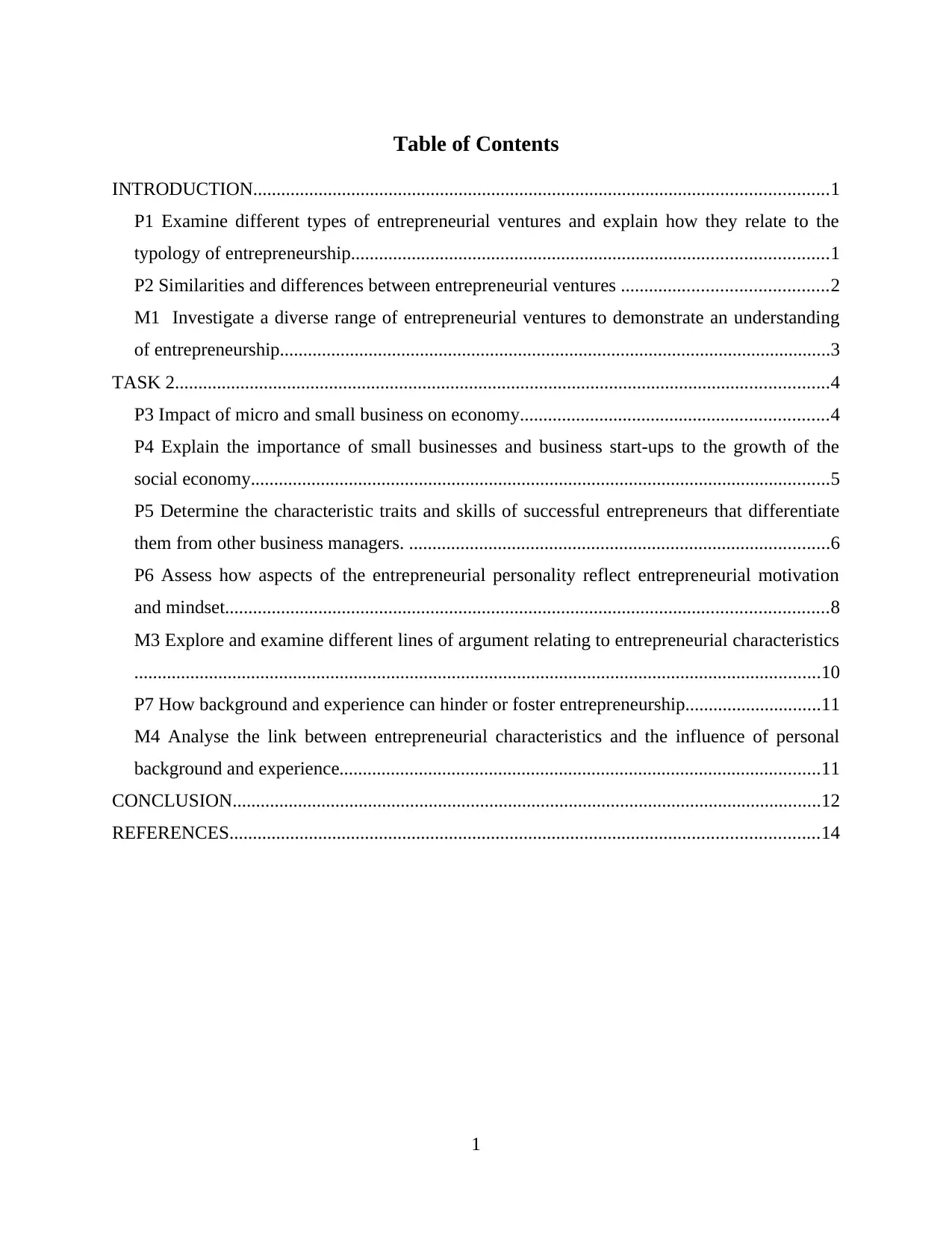
Table of Contents
INTRODUCTION...........................................................................................................................1
P1 Examine different types of entrepreneurial ventures and explain how they relate to the
typology of entrepreneurship......................................................................................................1
P2 Similarities and differences between entrepreneurial ventures ............................................2
M1 Investigate a diverse range of entrepreneurial ventures to demonstrate an understanding
of entrepreneurship......................................................................................................................3
TASK 2............................................................................................................................................4
P3 Impact of micro and small business on economy..................................................................4
P4 Explain the importance of small businesses and business start-ups to the growth of the
social economy............................................................................................................................5
P5 Determine the characteristic traits and skills of successful entrepreneurs that differentiate
them from other business managers. ..........................................................................................6
P6 Assess how aspects of the entrepreneurial personality reflect entrepreneurial motivation
and mindset.................................................................................................................................8
M3 Explore and examine different lines of argument relating to entrepreneurial characteristics
...................................................................................................................................................10
P7 How background and experience can hinder or foster entrepreneurship.............................11
M4 Analyse the link between entrepreneurial characteristics and the influence of personal
background and experience.......................................................................................................11
CONCLUSION..............................................................................................................................12
REFERENCES..............................................................................................................................14
1
INTRODUCTION...........................................................................................................................1
P1 Examine different types of entrepreneurial ventures and explain how they relate to the
typology of entrepreneurship......................................................................................................1
P2 Similarities and differences between entrepreneurial ventures ............................................2
M1 Investigate a diverse range of entrepreneurial ventures to demonstrate an understanding
of entrepreneurship......................................................................................................................3
TASK 2............................................................................................................................................4
P3 Impact of micro and small business on economy..................................................................4
P4 Explain the importance of small businesses and business start-ups to the growth of the
social economy............................................................................................................................5
P5 Determine the characteristic traits and skills of successful entrepreneurs that differentiate
them from other business managers. ..........................................................................................6
P6 Assess how aspects of the entrepreneurial personality reflect entrepreneurial motivation
and mindset.................................................................................................................................8
M3 Explore and examine different lines of argument relating to entrepreneurial characteristics
...................................................................................................................................................10
P7 How background and experience can hinder or foster entrepreneurship.............................11
M4 Analyse the link between entrepreneurial characteristics and the influence of personal
background and experience.......................................................................................................11
CONCLUSION..............................................................................................................................12
REFERENCES..............................................................................................................................14
1
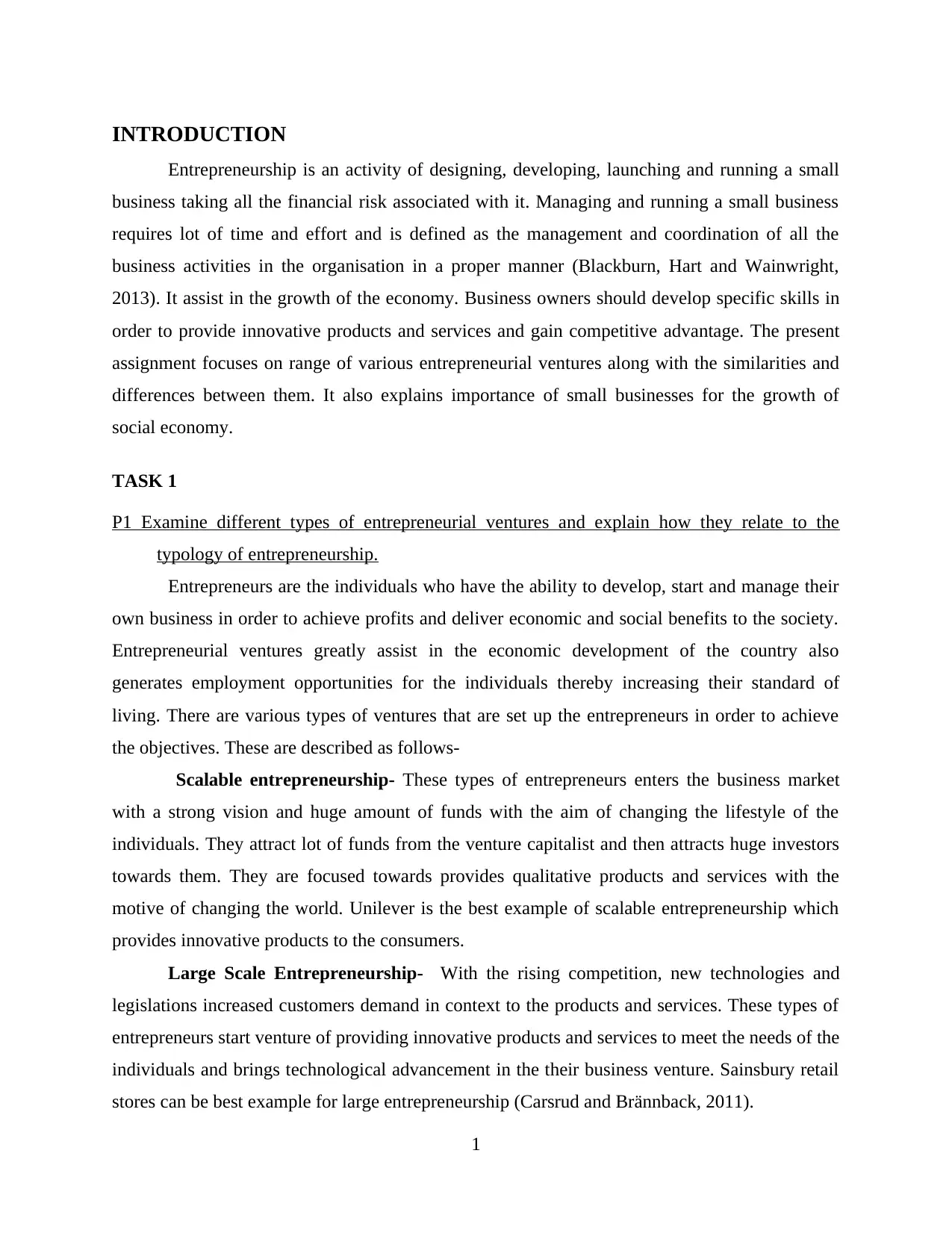
INTRODUCTION
Entrepreneurship is an activity of designing, developing, launching and running a small
business taking all the financial risk associated with it. Managing and running a small business
requires lot of time and effort and is defined as the management and coordination of all the
business activities in the organisation in a proper manner (Blackburn, Hart and Wainwright,
2013). It assist in the growth of the economy. Business owners should develop specific skills in
order to provide innovative products and services and gain competitive advantage. The present
assignment focuses on range of various entrepreneurial ventures along with the similarities and
differences between them. It also explains importance of small businesses for the growth of
social economy.
TASK 1
P1 Examine different types of entrepreneurial ventures and explain how they relate to the
typology of entrepreneurship.
Entrepreneurs are the individuals who have the ability to develop, start and manage their
own business in order to achieve profits and deliver economic and social benefits to the society.
Entrepreneurial ventures greatly assist in the economic development of the country also
generates employment opportunities for the individuals thereby increasing their standard of
living. There are various types of ventures that are set up the entrepreneurs in order to achieve
the objectives. These are described as follows-
Scalable entrepreneurship- These types of entrepreneurs enters the business market
with a strong vision and huge amount of funds with the aim of changing the lifestyle of the
individuals. They attract lot of funds from the venture capitalist and then attracts huge investors
towards them. They are focused towards provides qualitative products and services with the
motive of changing the world. Unilever is the best example of scalable entrepreneurship which
provides innovative products to the consumers.
Large Scale Entrepreneurship- With the rising competition, new technologies and
legislations increased customers demand in context to the products and services. These types of
entrepreneurs start venture of providing innovative products and services to meet the needs of the
individuals and brings technological advancement in the their business venture. Sainsbury retail
stores can be best example for large entrepreneurship (Carsrud and Brännback, 2011).
1
Entrepreneurship is an activity of designing, developing, launching and running a small
business taking all the financial risk associated with it. Managing and running a small business
requires lot of time and effort and is defined as the management and coordination of all the
business activities in the organisation in a proper manner (Blackburn, Hart and Wainwright,
2013). It assist in the growth of the economy. Business owners should develop specific skills in
order to provide innovative products and services and gain competitive advantage. The present
assignment focuses on range of various entrepreneurial ventures along with the similarities and
differences between them. It also explains importance of small businesses for the growth of
social economy.
TASK 1
P1 Examine different types of entrepreneurial ventures and explain how they relate to the
typology of entrepreneurship.
Entrepreneurs are the individuals who have the ability to develop, start and manage their
own business in order to achieve profits and deliver economic and social benefits to the society.
Entrepreneurial ventures greatly assist in the economic development of the country also
generates employment opportunities for the individuals thereby increasing their standard of
living. There are various types of ventures that are set up the entrepreneurs in order to achieve
the objectives. These are described as follows-
Scalable entrepreneurship- These types of entrepreneurs enters the business market
with a strong vision and huge amount of funds with the aim of changing the lifestyle of the
individuals. They attract lot of funds from the venture capitalist and then attracts huge investors
towards them. They are focused towards provides qualitative products and services with the
motive of changing the world. Unilever is the best example of scalable entrepreneurship which
provides innovative products to the consumers.
Large Scale Entrepreneurship- With the rising competition, new technologies and
legislations increased customers demand in context to the products and services. These types of
entrepreneurs start venture of providing innovative products and services to meet the needs of the
individuals and brings technological advancement in the their business venture. Sainsbury retail
stores can be best example for large entrepreneurship (Carsrud and Brännback, 2011).
1
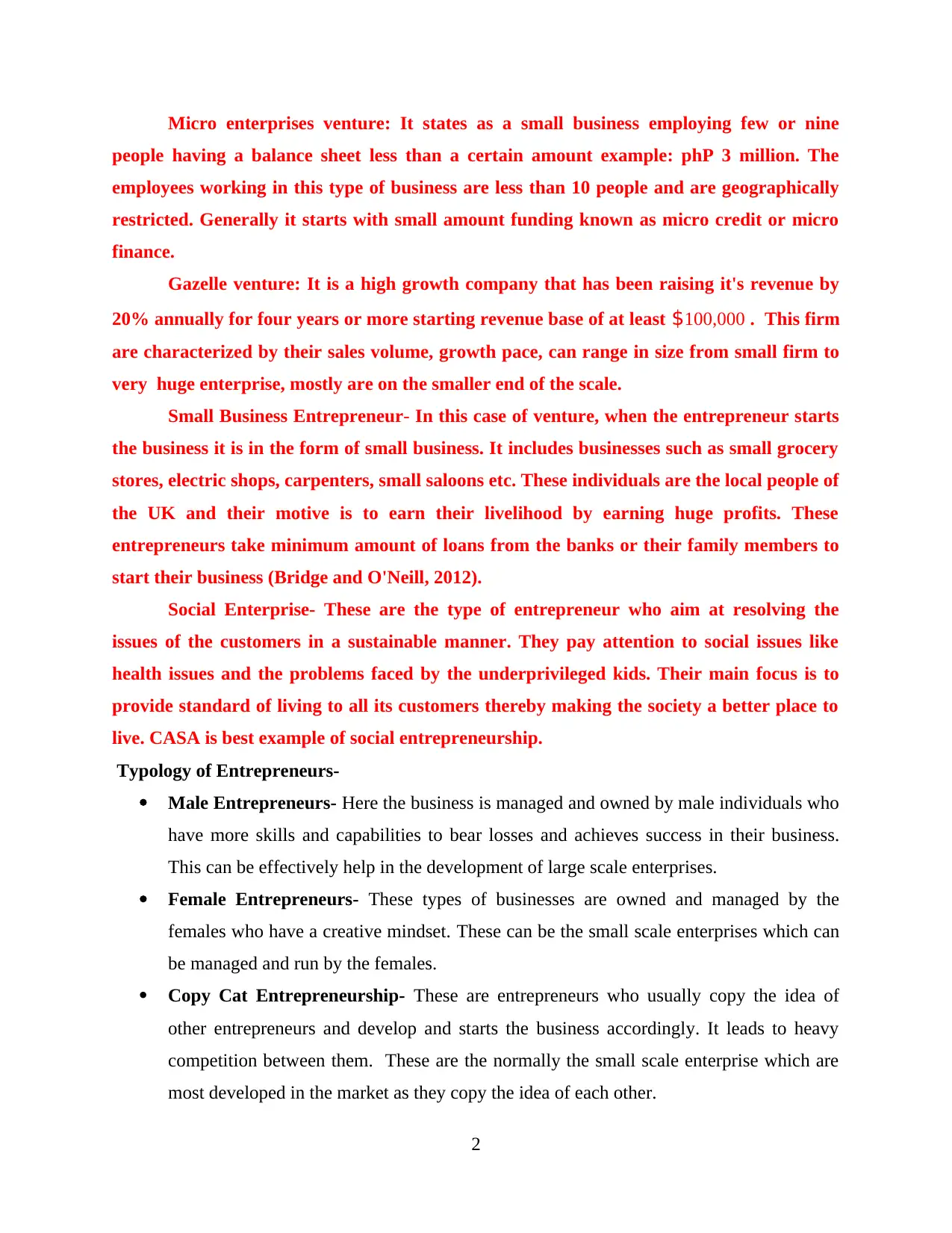
Micro enterprises venture: It states as a small business employing few or nine
people having a balance sheet less than a certain amount example: phP 3 million. The
employees working in this type of business are less than 10 people and are geographically
restricted. Generally it starts with small amount funding known as micro credit or micro
finance.
Gazelle venture: It is a high growth company that has been raising it's revenue by
20% annually for four years or more starting revenue base of at least $100,000 . This firm
are characterized by their sales volume, growth pace, can range in size from small firm to
very huge enterprise, mostly are on the smaller end of the scale.
Small Business Entrepreneur- In this case of venture, when the entrepreneur starts
the business it is in the form of small business. It includes businesses such as small grocery
stores, electric shops, carpenters, small saloons etc. These individuals are the local people of
the UK and their motive is to earn their livelihood by earning huge profits. These
entrepreneurs take minimum amount of loans from the banks or their family members to
start their business (Bridge and O'Neill, 2012).
Social Enterprise- These are the type of entrepreneur who aim at resolving the
issues of the customers in a sustainable manner. They pay attention to social issues like
health issues and the problems faced by the underprivileged kids. Their main focus is to
provide standard of living to all its customers thereby making the society a better place to
live. CASA is best example of social entrepreneurship.
Typology of Entrepreneurs-
Male Entrepreneurs- Here the business is managed and owned by male individuals who
have more skills and capabilities to bear losses and achieves success in their business.
This can be effectively help in the development of large scale enterprises.
Female Entrepreneurs- These types of businesses are owned and managed by the
females who have a creative mindset. These can be the small scale enterprises which can
be managed and run by the females.
Copy Cat Entrepreneurship- These are entrepreneurs who usually copy the idea of
other entrepreneurs and develop and starts the business accordingly. It leads to heavy
competition between them. These are the normally the small scale enterprise which are
most developed in the market as they copy the idea of each other.
2
people having a balance sheet less than a certain amount example: phP 3 million. The
employees working in this type of business are less than 10 people and are geographically
restricted. Generally it starts with small amount funding known as micro credit or micro
finance.
Gazelle venture: It is a high growth company that has been raising it's revenue by
20% annually for four years or more starting revenue base of at least $100,000 . This firm
are characterized by their sales volume, growth pace, can range in size from small firm to
very huge enterprise, mostly are on the smaller end of the scale.
Small Business Entrepreneur- In this case of venture, when the entrepreneur starts
the business it is in the form of small business. It includes businesses such as small grocery
stores, electric shops, carpenters, small saloons etc. These individuals are the local people of
the UK and their motive is to earn their livelihood by earning huge profits. These
entrepreneurs take minimum amount of loans from the banks or their family members to
start their business (Bridge and O'Neill, 2012).
Social Enterprise- These are the type of entrepreneur who aim at resolving the
issues of the customers in a sustainable manner. They pay attention to social issues like
health issues and the problems faced by the underprivileged kids. Their main focus is to
provide standard of living to all its customers thereby making the society a better place to
live. CASA is best example of social entrepreneurship.
Typology of Entrepreneurs-
Male Entrepreneurs- Here the business is managed and owned by male individuals who
have more skills and capabilities to bear losses and achieves success in their business.
This can be effectively help in the development of large scale enterprises.
Female Entrepreneurs- These types of businesses are owned and managed by the
females who have a creative mindset. These can be the small scale enterprises which can
be managed and run by the females.
Copy Cat Entrepreneurship- These are entrepreneurs who usually copy the idea of
other entrepreneurs and develop and starts the business accordingly. It leads to heavy
competition between them. These are the normally the small scale enterprise which are
most developed in the market as they copy the idea of each other.
2
Secure Best Marks with AI Grader
Need help grading? Try our AI Grader for instant feedback on your assignments.
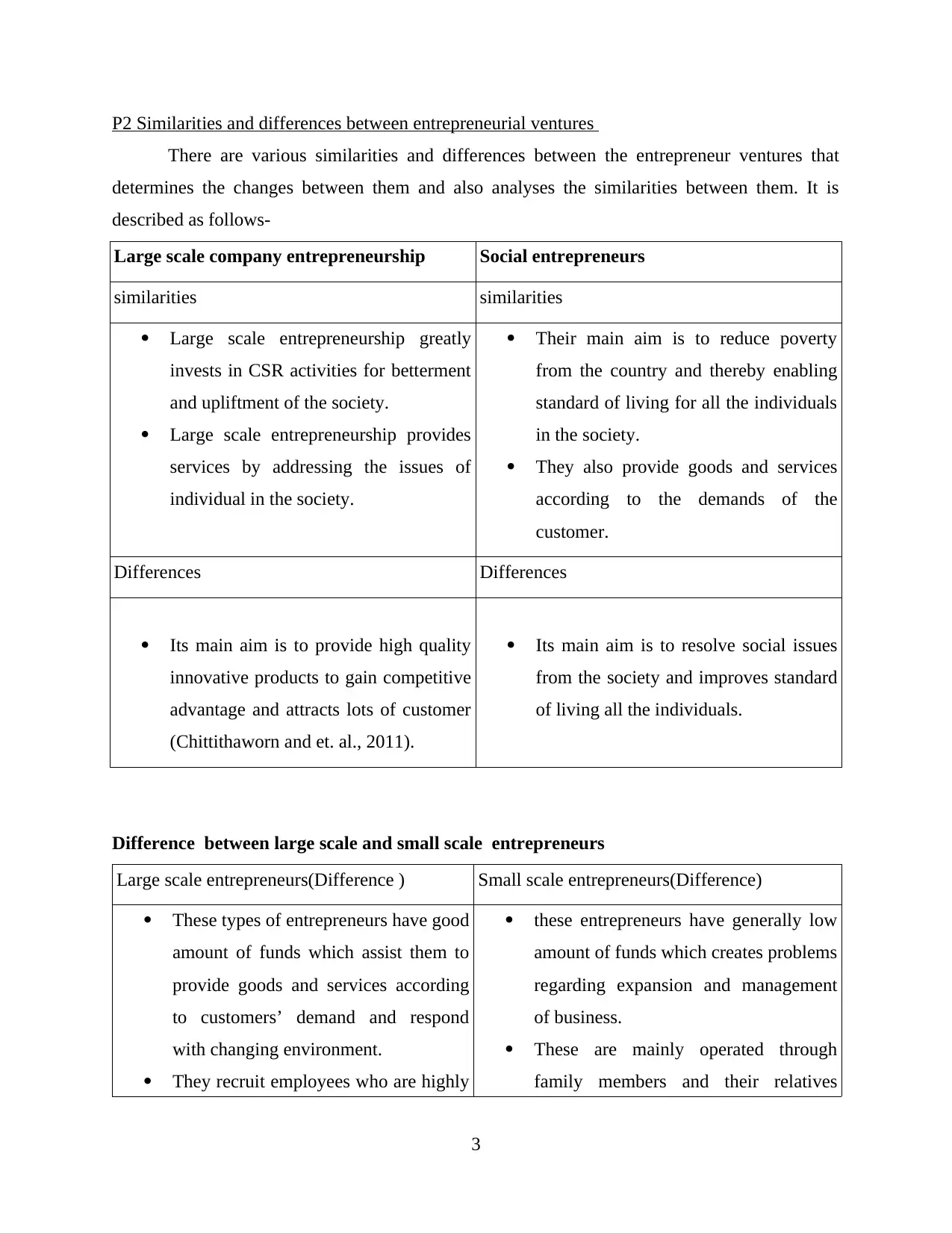
P2 Similarities and differences between entrepreneurial ventures
There are various similarities and differences between the entrepreneur ventures that
determines the changes between them and also analyses the similarities between them. It is
described as follows-
Large scale company entrepreneurship Social entrepreneurs
similarities similarities
Large scale entrepreneurship greatly
invests in CSR activities for betterment
and upliftment of the society.
Large scale entrepreneurship provides
services by addressing the issues of
individual in the society.
Their main aim is to reduce poverty
from the country and thereby enabling
standard of living for all the individuals
in the society.
They also provide goods and services
according to the demands of the
customer.
Differences Differences
Its main aim is to provide high quality
innovative products to gain competitive
advantage and attracts lots of customer
(Chittithaworn and et. al., 2011).
Its main aim is to resolve social issues
from the society and improves standard
of living all the individuals.
Difference between large scale and small scale entrepreneurs
Large scale entrepreneurs(Difference ) Small scale entrepreneurs(Difference)
These types of entrepreneurs have good
amount of funds which assist them to
provide goods and services according
to customers’ demand and respond
with changing environment.
They recruit employees who are highly
these entrepreneurs have generally low
amount of funds which creates problems
regarding expansion and management
of business.
These are mainly operated through
family members and their relatives
3
There are various similarities and differences between the entrepreneur ventures that
determines the changes between them and also analyses the similarities between them. It is
described as follows-
Large scale company entrepreneurship Social entrepreneurs
similarities similarities
Large scale entrepreneurship greatly
invests in CSR activities for betterment
and upliftment of the society.
Large scale entrepreneurship provides
services by addressing the issues of
individual in the society.
Their main aim is to reduce poverty
from the country and thereby enabling
standard of living for all the individuals
in the society.
They also provide goods and services
according to the demands of the
customer.
Differences Differences
Its main aim is to provide high quality
innovative products to gain competitive
advantage and attracts lots of customer
(Chittithaworn and et. al., 2011).
Its main aim is to resolve social issues
from the society and improves standard
of living all the individuals.
Difference between large scale and small scale entrepreneurs
Large scale entrepreneurs(Difference ) Small scale entrepreneurs(Difference)
These types of entrepreneurs have good
amount of funds which assist them to
provide goods and services according
to customers’ demand and respond
with changing environment.
They recruit employees who are highly
these entrepreneurs have generally low
amount of funds which creates problems
regarding expansion and management
of business.
These are mainly operated through
family members and their relatives
3
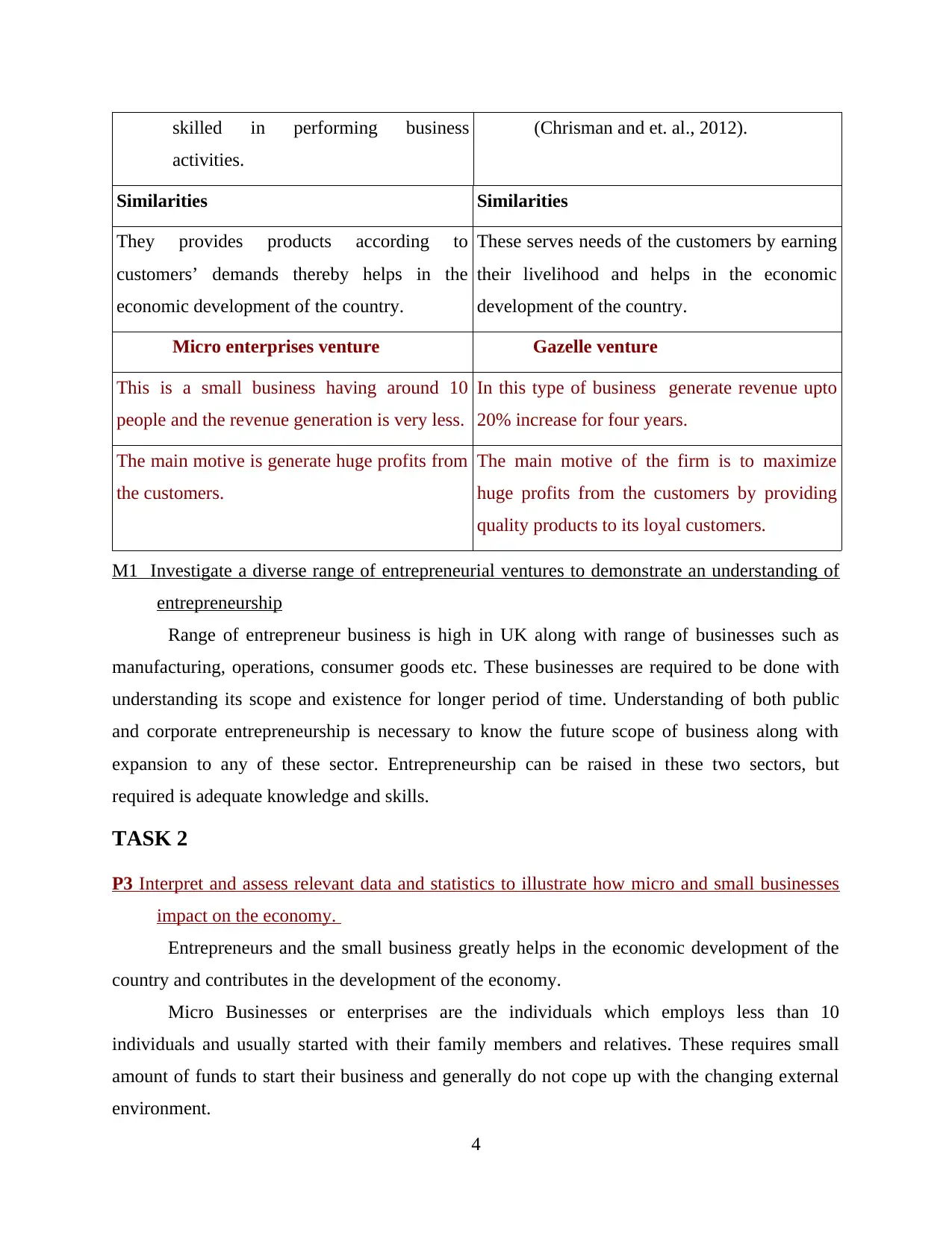
skilled in performing business
activities.
(Chrisman and et. al., 2012).
Similarities Similarities
They provides products according to
customers’ demands thereby helps in the
economic development of the country.
These serves needs of the customers by earning
their livelihood and helps in the economic
development of the country.
Micro enterprises venture Gazelle venture
This is a small business having around 10
people and the revenue generation is very less.
In this type of business generate revenue upto
20% increase for four years.
The main motive is generate huge profits from
the customers.
The main motive of the firm is to maximize
huge profits from the customers by providing
quality products to its loyal customers.
M1 Investigate a diverse range of entrepreneurial ventures to demonstrate an understanding of
entrepreneurship
Range of entrepreneur business is high in UK along with range of businesses such as
manufacturing, operations, consumer goods etc. These businesses are required to be done with
understanding its scope and existence for longer period of time. Understanding of both public
and corporate entrepreneurship is necessary to know the future scope of business along with
expansion to any of these sector. Entrepreneurship can be raised in these two sectors, but
required is adequate knowledge and skills.
TASK 2
P3 Interpret and assess relevant data and statistics to illustrate how micro and small businesses
impact on the economy.
Entrepreneurs and the small business greatly helps in the economic development of the
country and contributes in the development of the economy.
Micro Businesses or enterprises are the individuals which employs less than 10
individuals and usually started with their family members and relatives. These requires small
amount of funds to start their business and generally do not cope up with the changing external
environment.
4
activities.
(Chrisman and et. al., 2012).
Similarities Similarities
They provides products according to
customers’ demands thereby helps in the
economic development of the country.
These serves needs of the customers by earning
their livelihood and helps in the economic
development of the country.
Micro enterprises venture Gazelle venture
This is a small business having around 10
people and the revenue generation is very less.
In this type of business generate revenue upto
20% increase for four years.
The main motive is generate huge profits from
the customers.
The main motive of the firm is to maximize
huge profits from the customers by providing
quality products to its loyal customers.
M1 Investigate a diverse range of entrepreneurial ventures to demonstrate an understanding of
entrepreneurship
Range of entrepreneur business is high in UK along with range of businesses such as
manufacturing, operations, consumer goods etc. These businesses are required to be done with
understanding its scope and existence for longer period of time. Understanding of both public
and corporate entrepreneurship is necessary to know the future scope of business along with
expansion to any of these sector. Entrepreneurship can be raised in these two sectors, but
required is adequate knowledge and skills.
TASK 2
P3 Interpret and assess relevant data and statistics to illustrate how micro and small businesses
impact on the economy.
Entrepreneurs and the small business greatly helps in the economic development of the
country and contributes in the development of the economy.
Micro Businesses or enterprises are the individuals which employs less than 10
individuals and usually started with their family members and relatives. These requires small
amount of funds to start their business and generally do not cope up with the changing external
environment.
4
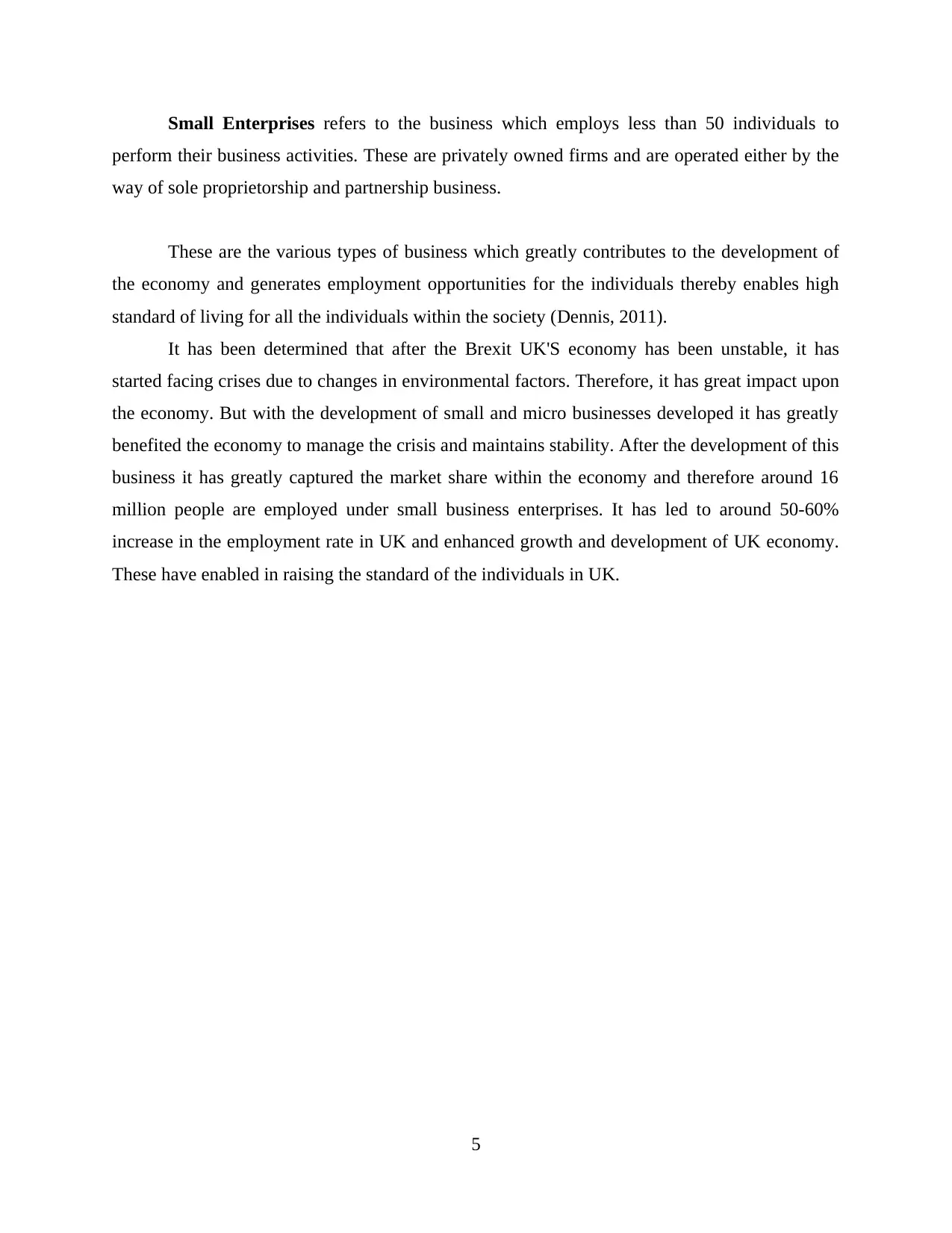
Small Enterprises refers to the business which employs less than 50 individuals to
perform their business activities. These are privately owned firms and are operated either by the
way of sole proprietorship and partnership business.
These are the various types of business which greatly contributes to the development of
the economy and generates employment opportunities for the individuals thereby enables high
standard of living for all the individuals within the society (Dennis, 2011).
It has been determined that after the Brexit UK'S economy has been unstable, it has
started facing crises due to changes in environmental factors. Therefore, it has great impact upon
the economy. But with the development of small and micro businesses developed it has greatly
benefited the economy to manage the crisis and maintains stability. After the development of this
business it has greatly captured the market share within the economy and therefore around 16
million people are employed under small business enterprises. It has led to around 50-60%
increase in the employment rate in UK and enhanced growth and development of UK economy.
These have enabled in raising the standard of the individuals in UK.
5
perform their business activities. These are privately owned firms and are operated either by the
way of sole proprietorship and partnership business.
These are the various types of business which greatly contributes to the development of
the economy and generates employment opportunities for the individuals thereby enables high
standard of living for all the individuals within the society (Dennis, 2011).
It has been determined that after the Brexit UK'S economy has been unstable, it has
started facing crises due to changes in environmental factors. Therefore, it has great impact upon
the economy. But with the development of small and micro businesses developed it has greatly
benefited the economy to manage the crisis and maintains stability. After the development of this
business it has greatly captured the market share within the economy and therefore around 16
million people are employed under small business enterprises. It has led to around 50-60%
increase in the employment rate in UK and enhanced growth and development of UK economy.
These have enabled in raising the standard of the individuals in UK.
5
Paraphrase This Document
Need a fresh take? Get an instant paraphrase of this document with our AI Paraphraser
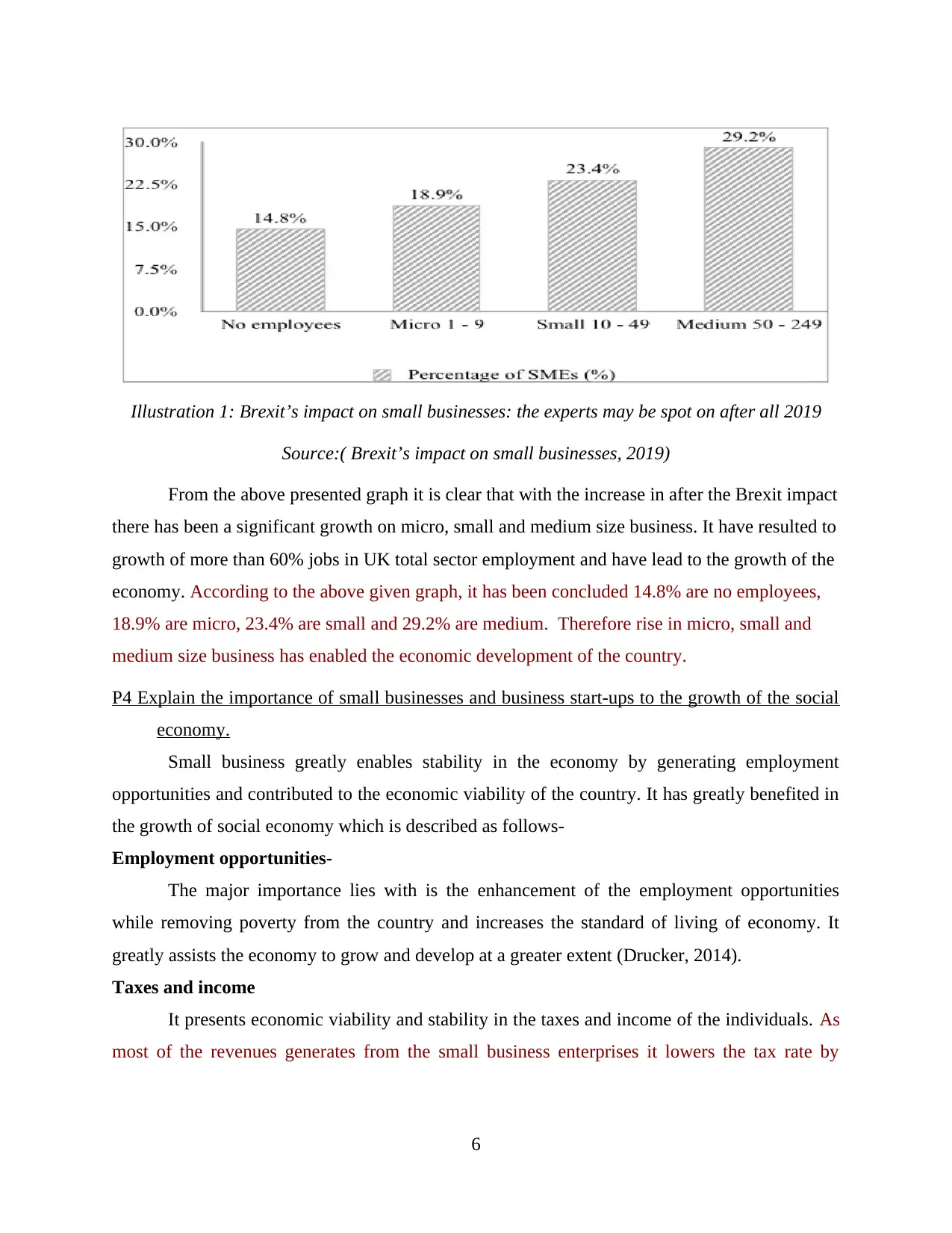
Illustration 1: Brexit’s impact on small businesses: the experts may be spot on after all 2019
Source:( Brexit’s impact on small businesses, 2019)
From the above presented graph it is clear that with the increase in after the Brexit impact
there has been a significant growth on micro, small and medium size business. It have resulted to
growth of more than 60% jobs in UK total sector employment and have lead to the growth of the
economy. According to the above given graph, it has been concluded 14.8% are no employees,
18.9% are micro, 23.4% are small and 29.2% are medium. Therefore rise in micro, small and
medium size business has enabled the economic development of the country.
P4 Explain the importance of small businesses and business start-ups to the growth of the social
economy.
Small business greatly enables stability in the economy by generating employment
opportunities and contributed to the economic viability of the country. It has greatly benefited in
the growth of social economy which is described as follows-
Employment opportunities-
The major importance lies with is the enhancement of the employment opportunities
while removing poverty from the country and increases the standard of living of economy. It
greatly assists the economy to grow and develop at a greater extent (Drucker, 2014).
Taxes and income
It presents economic viability and stability in the taxes and income of the individuals. As
most of the revenues generates from the small business enterprises it lowers the tax rate by
6
Source:( Brexit’s impact on small businesses, 2019)
From the above presented graph it is clear that with the increase in after the Brexit impact
there has been a significant growth on micro, small and medium size business. It have resulted to
growth of more than 60% jobs in UK total sector employment and have lead to the growth of the
economy. According to the above given graph, it has been concluded 14.8% are no employees,
18.9% are micro, 23.4% are small and 29.2% are medium. Therefore rise in micro, small and
medium size business has enabled the economic development of the country.
P4 Explain the importance of small businesses and business start-ups to the growth of the social
economy.
Small business greatly enables stability in the economy by generating employment
opportunities and contributed to the economic viability of the country. It has greatly benefited in
the growth of social economy which is described as follows-
Employment opportunities-
The major importance lies with is the enhancement of the employment opportunities
while removing poverty from the country and increases the standard of living of economy. It
greatly assists the economy to grow and develop at a greater extent (Drucker, 2014).
Taxes and income
It presents economic viability and stability in the taxes and income of the individuals. As
most of the revenues generates from the small business enterprises it lowers the tax rate by
6
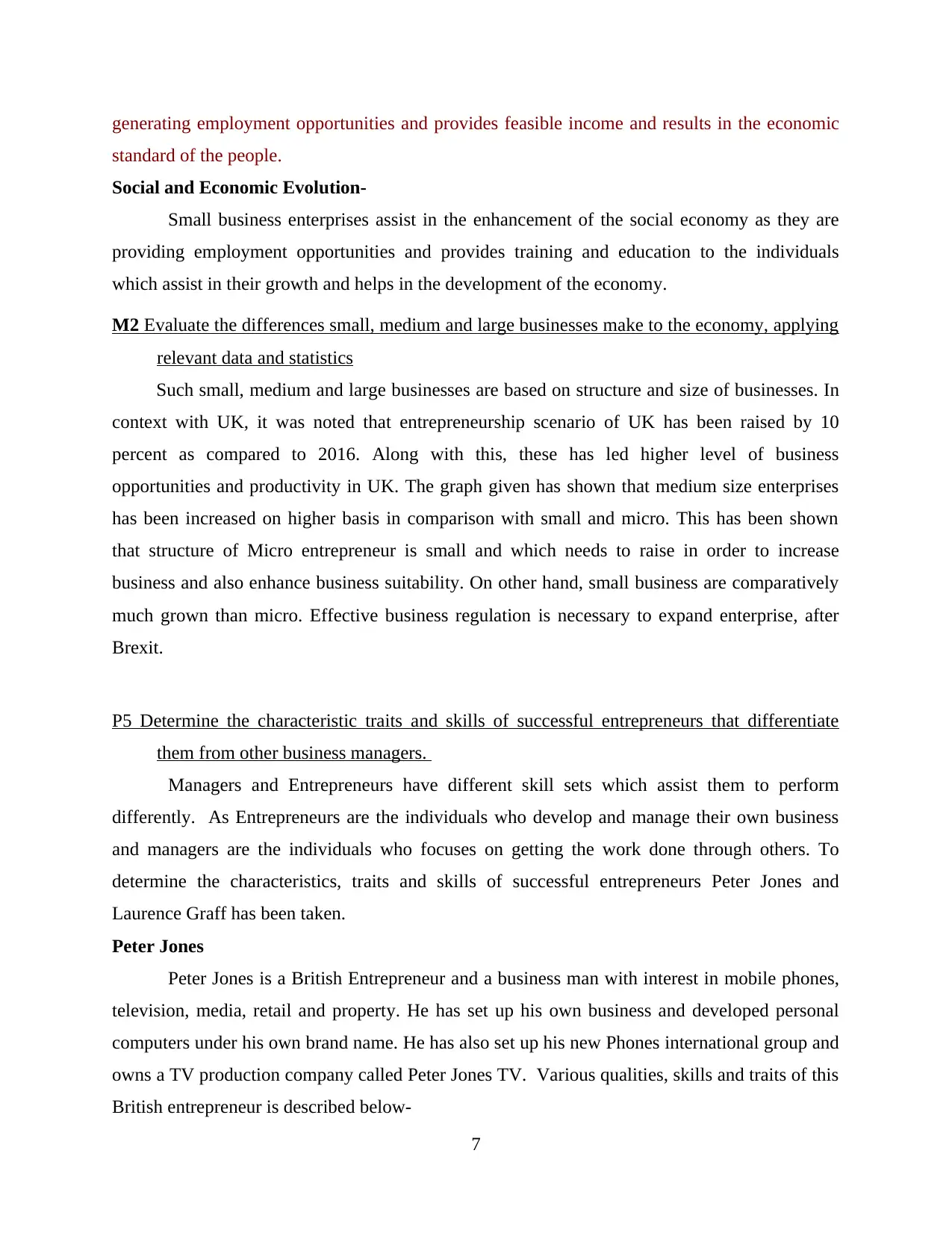
generating employment opportunities and provides feasible income and results in the economic
standard of the people.
Social and Economic Evolution-
Small business enterprises assist in the enhancement of the social economy as they are
providing employment opportunities and provides training and education to the individuals
which assist in their growth and helps in the development of the economy.
M2 Evaluate the differences small, medium and large businesses make to the economy, applying
relevant data and statistics
Such small, medium and large businesses are based on structure and size of businesses. In
context with UK, it was noted that entrepreneurship scenario of UK has been raised by 10
percent as compared to 2016. Along with this, these has led higher level of business
opportunities and productivity in UK. The graph given has shown that medium size enterprises
has been increased on higher basis in comparison with small and micro. This has been shown
that structure of Micro entrepreneur is small and which needs to raise in order to increase
business and also enhance business suitability. On other hand, small business are comparatively
much grown than micro. Effective business regulation is necessary to expand enterprise, after
Brexit.
P5 Determine the characteristic traits and skills of successful entrepreneurs that differentiate
them from other business managers.
Managers and Entrepreneurs have different skill sets which assist them to perform
differently. As Entrepreneurs are the individuals who develop and manage their own business
and managers are the individuals who focuses on getting the work done through others. To
determine the characteristics, traits and skills of successful entrepreneurs Peter Jones and
Laurence Graff has been taken.
Peter Jones
Peter Jones is a British Entrepreneur and a business man with interest in mobile phones,
television, media, retail and property. He has set up his own business and developed personal
computers under his own brand name. He has also set up his new Phones international group and
owns a TV production company called Peter Jones TV. Various qualities, skills and traits of this
British entrepreneur is described below-
7
standard of the people.
Social and Economic Evolution-
Small business enterprises assist in the enhancement of the social economy as they are
providing employment opportunities and provides training and education to the individuals
which assist in their growth and helps in the development of the economy.
M2 Evaluate the differences small, medium and large businesses make to the economy, applying
relevant data and statistics
Such small, medium and large businesses are based on structure and size of businesses. In
context with UK, it was noted that entrepreneurship scenario of UK has been raised by 10
percent as compared to 2016. Along with this, these has led higher level of business
opportunities and productivity in UK. The graph given has shown that medium size enterprises
has been increased on higher basis in comparison with small and micro. This has been shown
that structure of Micro entrepreneur is small and which needs to raise in order to increase
business and also enhance business suitability. On other hand, small business are comparatively
much grown than micro. Effective business regulation is necessary to expand enterprise, after
Brexit.
P5 Determine the characteristic traits and skills of successful entrepreneurs that differentiate
them from other business managers.
Managers and Entrepreneurs have different skill sets which assist them to perform
differently. As Entrepreneurs are the individuals who develop and manage their own business
and managers are the individuals who focuses on getting the work done through others. To
determine the characteristics, traits and skills of successful entrepreneurs Peter Jones and
Laurence Graff has been taken.
Peter Jones
Peter Jones is a British Entrepreneur and a business man with interest in mobile phones,
television, media, retail and property. He has set up his own business and developed personal
computers under his own brand name. He has also set up his new Phones international group and
owns a TV production company called Peter Jones TV. Various qualities, skills and traits of this
British entrepreneur is described below-
7
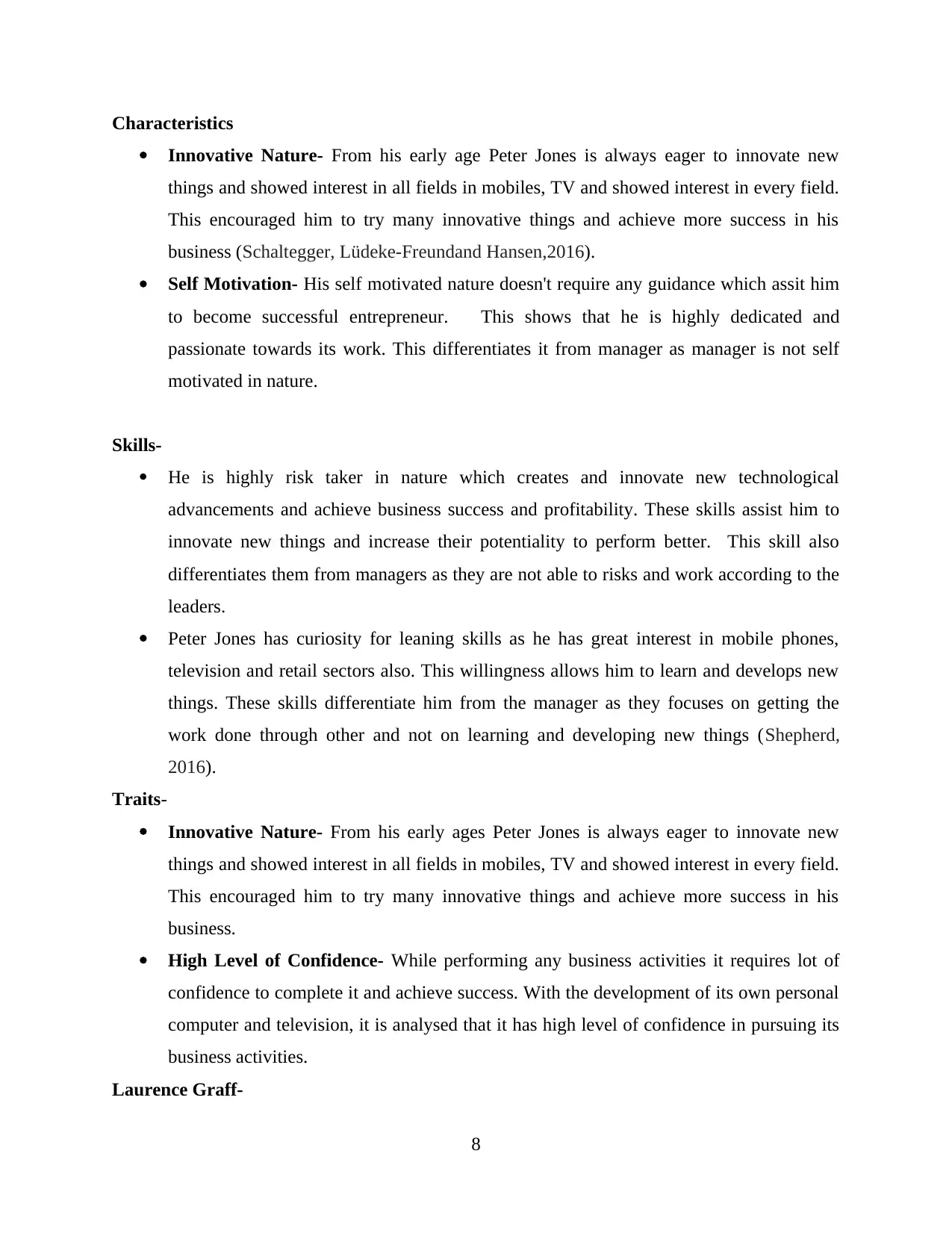
Characteristics
Innovative Nature- From his early age Peter Jones is always eager to innovate new
things and showed interest in all fields in mobiles, TV and showed interest in every field.
This encouraged him to try many innovative things and achieve more success in his
business (Schaltegger, Lüdeke-Freundand Hansen,2016).
Self Motivation- His self motivated nature doesn't require any guidance which assit him
to become successful entrepreneur. This shows that he is highly dedicated and
passionate towards its work. This differentiates it from manager as manager is not self
motivated in nature.
Skills-
He is highly risk taker in nature which creates and innovate new technological
advancements and achieve business success and profitability. These skills assist him to
innovate new things and increase their potentiality to perform better. This skill also
differentiates them from managers as they are not able to risks and work according to the
leaders.
Peter Jones has curiosity for leaning skills as he has great interest in mobile phones,
television and retail sectors also. This willingness allows him to learn and develops new
things. These skills differentiate him from the manager as they focuses on getting the
work done through other and not on learning and developing new things (Shepherd,
2016).
Traits-
Innovative Nature- From his early ages Peter Jones is always eager to innovate new
things and showed interest in all fields in mobiles, TV and showed interest in every field.
This encouraged him to try many innovative things and achieve more success in his
business.
High Level of Confidence- While performing any business activities it requires lot of
confidence to complete it and achieve success. With the development of its own personal
computer and television, it is analysed that it has high level of confidence in pursuing its
business activities.
Laurence Graff-
8
Innovative Nature- From his early age Peter Jones is always eager to innovate new
things and showed interest in all fields in mobiles, TV and showed interest in every field.
This encouraged him to try many innovative things and achieve more success in his
business (Schaltegger, Lüdeke-Freundand Hansen,2016).
Self Motivation- His self motivated nature doesn't require any guidance which assit him
to become successful entrepreneur. This shows that he is highly dedicated and
passionate towards its work. This differentiates it from manager as manager is not self
motivated in nature.
Skills-
He is highly risk taker in nature which creates and innovate new technological
advancements and achieve business success and profitability. These skills assist him to
innovate new things and increase their potentiality to perform better. This skill also
differentiates them from managers as they are not able to risks and work according to the
leaders.
Peter Jones has curiosity for leaning skills as he has great interest in mobile phones,
television and retail sectors also. This willingness allows him to learn and develops new
things. These skills differentiate him from the manager as they focuses on getting the
work done through other and not on learning and developing new things (Shepherd,
2016).
Traits-
Innovative Nature- From his early ages Peter Jones is always eager to innovate new
things and showed interest in all fields in mobiles, TV and showed interest in every field.
This encouraged him to try many innovative things and achieve more success in his
business.
High Level of Confidence- While performing any business activities it requires lot of
confidence to complete it and achieve success. With the development of its own personal
computer and television, it is analysed that it has high level of confidence in pursuing its
business activities.
Laurence Graff-
8
Secure Best Marks with AI Grader
Need help grading? Try our AI Grader for instant feedback on your assignments.
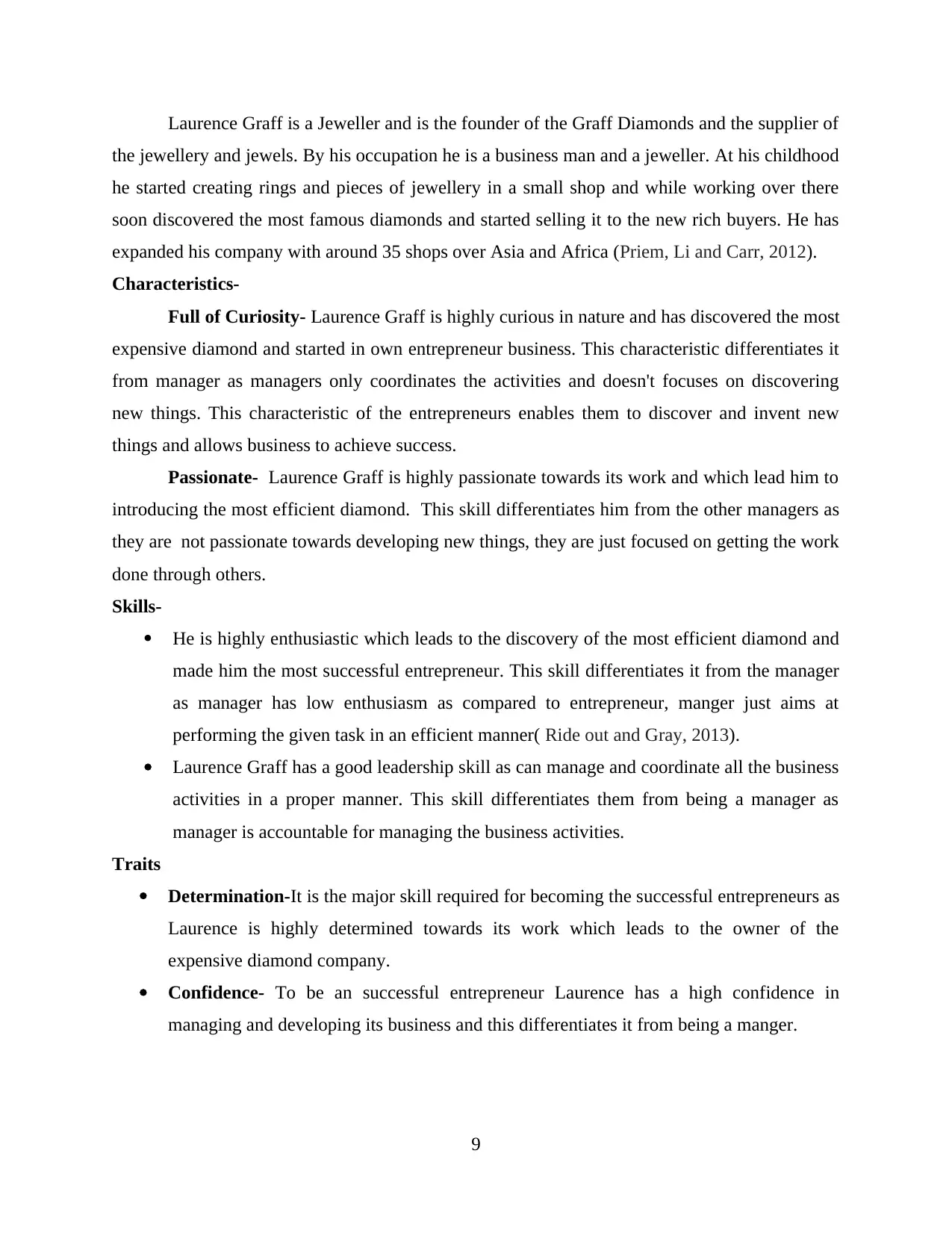
Laurence Graff is a Jeweller and is the founder of the Graff Diamonds and the supplier of
the jewellery and jewels. By his occupation he is a business man and a jeweller. At his childhood
he started creating rings and pieces of jewellery in a small shop and while working over there
soon discovered the most famous diamonds and started selling it to the new rich buyers. He has
expanded his company with around 35 shops over Asia and Africa (Priem, Li and Carr, 2012).
Characteristics-
Full of Curiosity- Laurence Graff is highly curious in nature and has discovered the most
expensive diamond and started in own entrepreneur business. This characteristic differentiates it
from manager as managers only coordinates the activities and doesn't focuses on discovering
new things. This characteristic of the entrepreneurs enables them to discover and invent new
things and allows business to achieve success.
Passionate- Laurence Graff is highly passionate towards its work and which lead him to
introducing the most efficient diamond. This skill differentiates him from the other managers as
they are not passionate towards developing new things, they are just focused on getting the work
done through others.
Skills-
He is highly enthusiastic which leads to the discovery of the most efficient diamond and
made him the most successful entrepreneur. This skill differentiates it from the manager
as manager has low enthusiasm as compared to entrepreneur, manger just aims at
performing the given task in an efficient manner( Ride out and Gray, 2013).
Laurence Graff has a good leadership skill as can manage and coordinate all the business
activities in a proper manner. This skill differentiates them from being a manager as
manager is accountable for managing the business activities.
Traits
Determination-It is the major skill required for becoming the successful entrepreneurs as
Laurence is highly determined towards its work which leads to the owner of the
expensive diamond company.
Confidence- To be an successful entrepreneur Laurence has a high confidence in
managing and developing its business and this differentiates it from being a manger.
9
the jewellery and jewels. By his occupation he is a business man and a jeweller. At his childhood
he started creating rings and pieces of jewellery in a small shop and while working over there
soon discovered the most famous diamonds and started selling it to the new rich buyers. He has
expanded his company with around 35 shops over Asia and Africa (Priem, Li and Carr, 2012).
Characteristics-
Full of Curiosity- Laurence Graff is highly curious in nature and has discovered the most
expensive diamond and started in own entrepreneur business. This characteristic differentiates it
from manager as managers only coordinates the activities and doesn't focuses on discovering
new things. This characteristic of the entrepreneurs enables them to discover and invent new
things and allows business to achieve success.
Passionate- Laurence Graff is highly passionate towards its work and which lead him to
introducing the most efficient diamond. This skill differentiates him from the other managers as
they are not passionate towards developing new things, they are just focused on getting the work
done through others.
Skills-
He is highly enthusiastic which leads to the discovery of the most efficient diamond and
made him the most successful entrepreneur. This skill differentiates it from the manager
as manager has low enthusiasm as compared to entrepreneur, manger just aims at
performing the given task in an efficient manner( Ride out and Gray, 2013).
Laurence Graff has a good leadership skill as can manage and coordinate all the business
activities in a proper manner. This skill differentiates them from being a manager as
manager is accountable for managing the business activities.
Traits
Determination-It is the major skill required for becoming the successful entrepreneurs as
Laurence is highly determined towards its work which leads to the owner of the
expensive diamond company.
Confidence- To be an successful entrepreneur Laurence has a high confidence in
managing and developing its business and this differentiates it from being a manger.
9
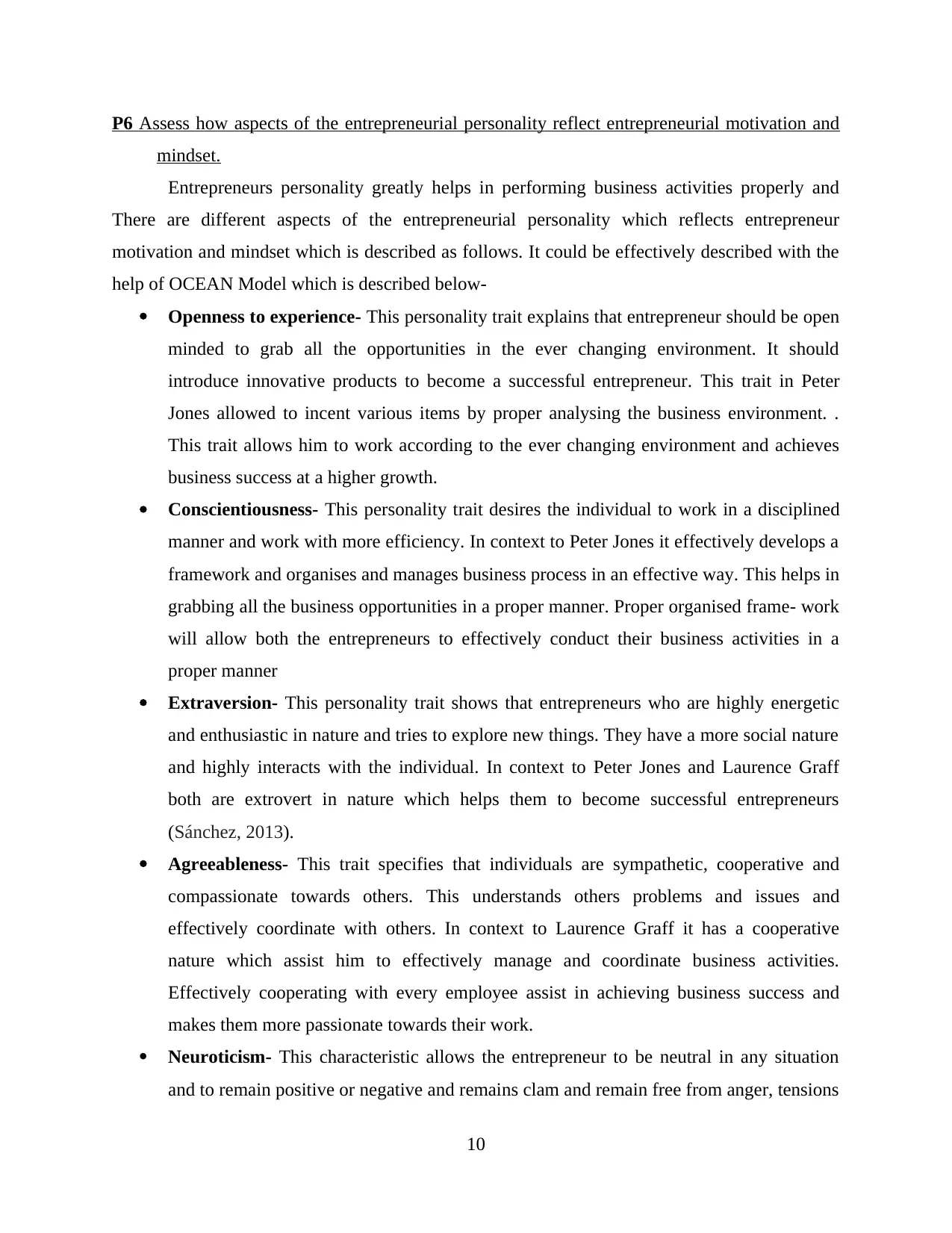
P6 Assess how aspects of the entrepreneurial personality reflect entrepreneurial motivation and
mindset.
Entrepreneurs personality greatly helps in performing business activities properly and
There are different aspects of the entrepreneurial personality which reflects entrepreneur
motivation and mindset which is described as follows. It could be effectively described with the
help of OCEAN Model which is described below-
Openness to experience- This personality trait explains that entrepreneur should be open
minded to grab all the opportunities in the ever changing environment. It should
introduce innovative products to become a successful entrepreneur. This trait in Peter
Jones allowed to incent various items by proper analysing the business environment. .
This trait allows him to work according to the ever changing environment and achieves
business success at a higher growth.
Conscientiousness- This personality trait desires the individual to work in a disciplined
manner and work with more efficiency. In context to Peter Jones it effectively develops a
framework and organises and manages business process in an effective way. This helps in
grabbing all the business opportunities in a proper manner. Proper organised frame- work
will allow both the entrepreneurs to effectively conduct their business activities in a
proper manner
Extraversion- This personality trait shows that entrepreneurs who are highly energetic
and enthusiastic in nature and tries to explore new things. They have a more social nature
and highly interacts with the individual. In context to Peter Jones and Laurence Graff
both are extrovert in nature which helps them to become successful entrepreneurs
(Sánchez, 2013).
Agreeableness- This trait specifies that individuals are sympathetic, cooperative and
compassionate towards others. This understands others problems and issues and
effectively coordinate with others. In context to Laurence Graff it has a cooperative
nature which assist him to effectively manage and coordinate business activities.
Effectively cooperating with every employee assist in achieving business success and
makes them more passionate towards their work.
Neuroticism- This characteristic allows the entrepreneur to be neutral in any situation
and to remain positive or negative and remains clam and remain free from anger, tensions
10
mindset.
Entrepreneurs personality greatly helps in performing business activities properly and
There are different aspects of the entrepreneurial personality which reflects entrepreneur
motivation and mindset which is described as follows. It could be effectively described with the
help of OCEAN Model which is described below-
Openness to experience- This personality trait explains that entrepreneur should be open
minded to grab all the opportunities in the ever changing environment. It should
introduce innovative products to become a successful entrepreneur. This trait in Peter
Jones allowed to incent various items by proper analysing the business environment. .
This trait allows him to work according to the ever changing environment and achieves
business success at a higher growth.
Conscientiousness- This personality trait desires the individual to work in a disciplined
manner and work with more efficiency. In context to Peter Jones it effectively develops a
framework and organises and manages business process in an effective way. This helps in
grabbing all the business opportunities in a proper manner. Proper organised frame- work
will allow both the entrepreneurs to effectively conduct their business activities in a
proper manner
Extraversion- This personality trait shows that entrepreneurs who are highly energetic
and enthusiastic in nature and tries to explore new things. They have a more social nature
and highly interacts with the individual. In context to Peter Jones and Laurence Graff
both are extrovert in nature which helps them to become successful entrepreneurs
(Sánchez, 2013).
Agreeableness- This trait specifies that individuals are sympathetic, cooperative and
compassionate towards others. This understands others problems and issues and
effectively coordinate with others. In context to Laurence Graff it has a cooperative
nature which assist him to effectively manage and coordinate business activities.
Effectively cooperating with every employee assist in achieving business success and
makes them more passionate towards their work.
Neuroticism- This characteristic allows the entrepreneur to be neutral in any situation
and to remain positive or negative and remains clam and remain free from anger, tensions
10
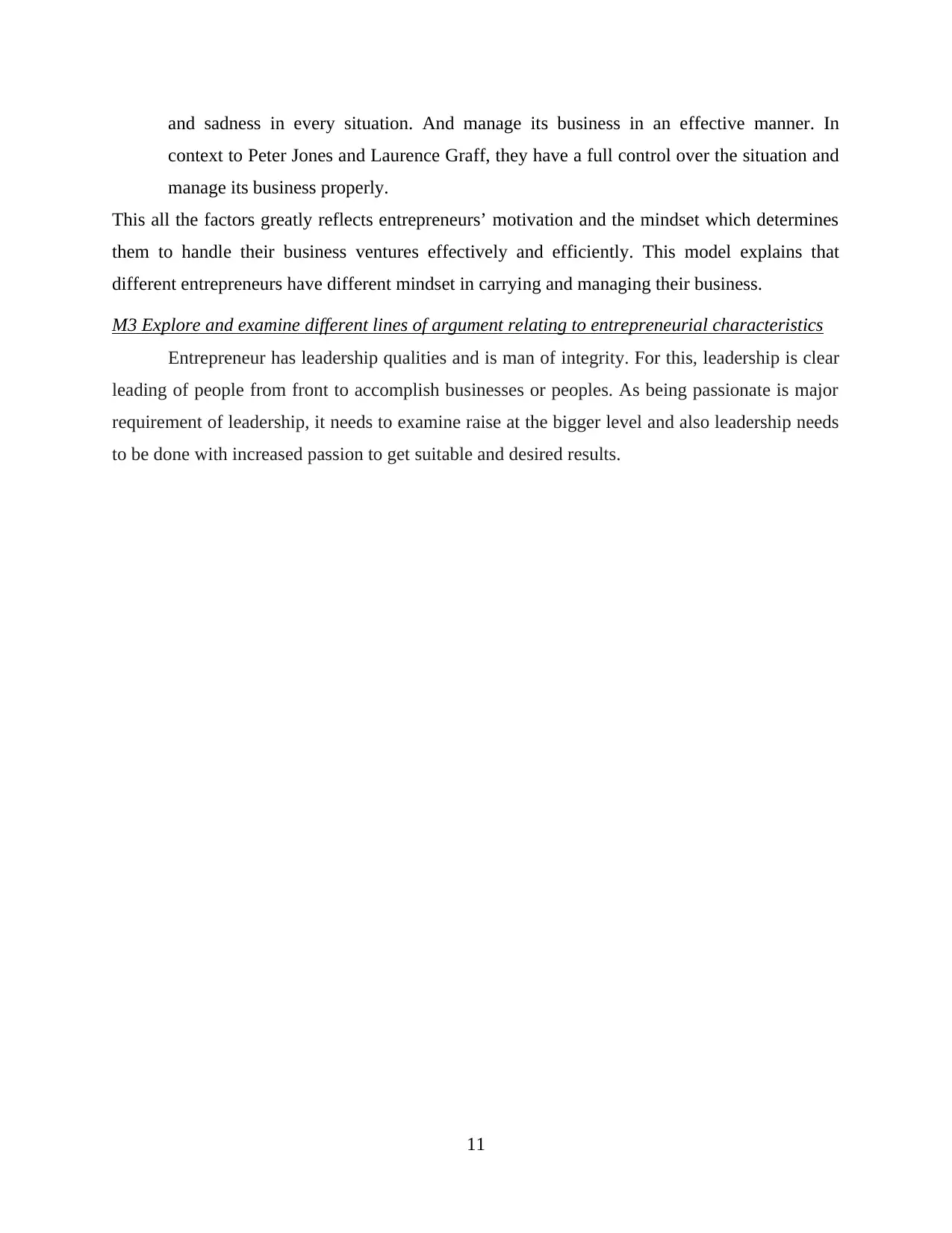
and sadness in every situation. And manage its business in an effective manner. In
context to Peter Jones and Laurence Graff, they have a full control over the situation and
manage its business properly.
This all the factors greatly reflects entrepreneurs’ motivation and the mindset which determines
them to handle their business ventures effectively and efficiently. This model explains that
different entrepreneurs have different mindset in carrying and managing their business.
M3 Explore and examine different lines of argument relating to entrepreneurial characteristics
Entrepreneur has leadership qualities and is man of integrity. For this, leadership is clear
leading of people from front to accomplish businesses or peoples. As being passionate is major
requirement of leadership, it needs to examine raise at the bigger level and also leadership needs
to be done with increased passion to get suitable and desired results.
11
context to Peter Jones and Laurence Graff, they have a full control over the situation and
manage its business properly.
This all the factors greatly reflects entrepreneurs’ motivation and the mindset which determines
them to handle their business ventures effectively and efficiently. This model explains that
different entrepreneurs have different mindset in carrying and managing their business.
M3 Explore and examine different lines of argument relating to entrepreneurial characteristics
Entrepreneur has leadership qualities and is man of integrity. For this, leadership is clear
leading of people from front to accomplish businesses or peoples. As being passionate is major
requirement of leadership, it needs to examine raise at the bigger level and also leadership needs
to be done with increased passion to get suitable and desired results.
11
Paraphrase This Document
Need a fresh take? Get an instant paraphrase of this document with our AI Paraphraser
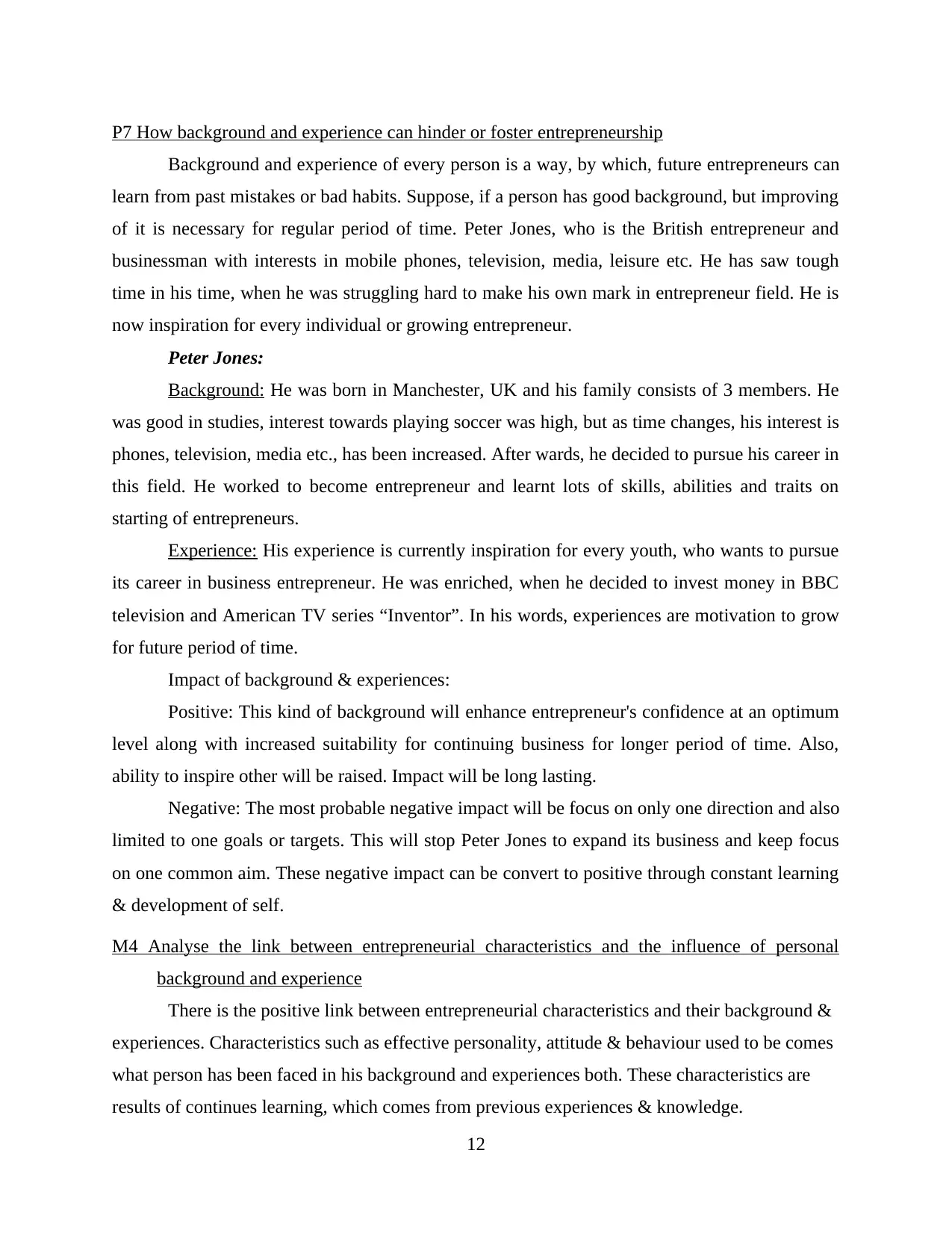
P7 How background and experience can hinder or foster entrepreneurship
Background and experience of every person is a way, by which, future entrepreneurs can
learn from past mistakes or bad habits. Suppose, if a person has good background, but improving
of it is necessary for regular period of time. Peter Jones, who is the British entrepreneur and
businessman with interests in mobile phones, television, media, leisure etc. He has saw tough
time in his time, when he was struggling hard to make his own mark in entrepreneur field. He is
now inspiration for every individual or growing entrepreneur.
Peter Jones:
Background: He was born in Manchester, UK and his family consists of 3 members. He
was good in studies, interest towards playing soccer was high, but as time changes, his interest is
phones, television, media etc., has been increased. After wards, he decided to pursue his career in
this field. He worked to become entrepreneur and learnt lots of skills, abilities and traits on
starting of entrepreneurs.
Experience: His experience is currently inspiration for every youth, who wants to pursue
its career in business entrepreneur. He was enriched, when he decided to invest money in BBC
television and American TV series “Inventor”. In his words, experiences are motivation to grow
for future period of time.
Impact of background & experiences:
Positive: This kind of background will enhance entrepreneur's confidence at an optimum
level along with increased suitability for continuing business for longer period of time. Also,
ability to inspire other will be raised. Impact will be long lasting.
Negative: The most probable negative impact will be focus on only one direction and also
limited to one goals or targets. This will stop Peter Jones to expand its business and keep focus
on one common aim. These negative impact can be convert to positive through constant learning
& development of self.
M4 Analyse the link between entrepreneurial characteristics and the influence of personal
background and experience
There is the positive link between entrepreneurial characteristics and their background &
experiences. Characteristics such as effective personality, attitude & behaviour used to be comes
what person has been faced in his background and experiences both. These characteristics are
results of continues learning, which comes from previous experiences & knowledge.
12
Background and experience of every person is a way, by which, future entrepreneurs can
learn from past mistakes or bad habits. Suppose, if a person has good background, but improving
of it is necessary for regular period of time. Peter Jones, who is the British entrepreneur and
businessman with interests in mobile phones, television, media, leisure etc. He has saw tough
time in his time, when he was struggling hard to make his own mark in entrepreneur field. He is
now inspiration for every individual or growing entrepreneur.
Peter Jones:
Background: He was born in Manchester, UK and his family consists of 3 members. He
was good in studies, interest towards playing soccer was high, but as time changes, his interest is
phones, television, media etc., has been increased. After wards, he decided to pursue his career in
this field. He worked to become entrepreneur and learnt lots of skills, abilities and traits on
starting of entrepreneurs.
Experience: His experience is currently inspiration for every youth, who wants to pursue
its career in business entrepreneur. He was enriched, when he decided to invest money in BBC
television and American TV series “Inventor”. In his words, experiences are motivation to grow
for future period of time.
Impact of background & experiences:
Positive: This kind of background will enhance entrepreneur's confidence at an optimum
level along with increased suitability for continuing business for longer period of time. Also,
ability to inspire other will be raised. Impact will be long lasting.
Negative: The most probable negative impact will be focus on only one direction and also
limited to one goals or targets. This will stop Peter Jones to expand its business and keep focus
on one common aim. These negative impact can be convert to positive through constant learning
& development of self.
M4 Analyse the link between entrepreneurial characteristics and the influence of personal
background and experience
There is the positive link between entrepreneurial characteristics and their background &
experiences. Characteristics such as effective personality, attitude & behaviour used to be comes
what person has been faced in his background and experiences both. These characteristics are
results of continues learning, which comes from previous experiences & knowledge.
12
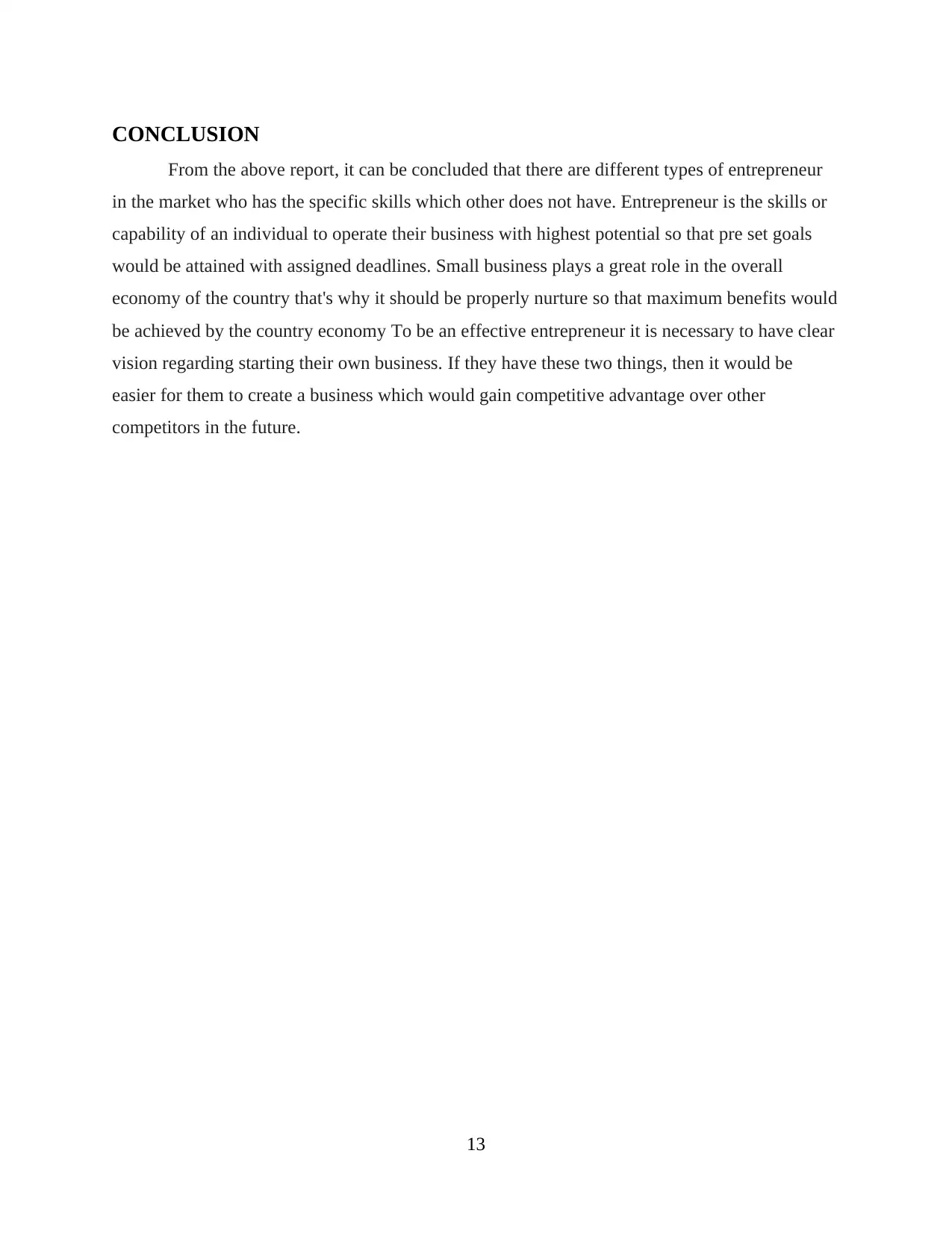
CONCLUSION
From the above report, it can be concluded that there are different types of entrepreneur
in the market who has the specific skills which other does not have. Entrepreneur is the skills or
capability of an individual to operate their business with highest potential so that pre set goals
would be attained with assigned deadlines. Small business plays a great role in the overall
economy of the country that's why it should be properly nurture so that maximum benefits would
be achieved by the country economy To be an effective entrepreneur it is necessary to have clear
vision regarding starting their own business. If they have these two things, then it would be
easier for them to create a business which would gain competitive advantage over other
competitors in the future.
13
From the above report, it can be concluded that there are different types of entrepreneur
in the market who has the specific skills which other does not have. Entrepreneur is the skills or
capability of an individual to operate their business with highest potential so that pre set goals
would be attained with assigned deadlines. Small business plays a great role in the overall
economy of the country that's why it should be properly nurture so that maximum benefits would
be achieved by the country economy To be an effective entrepreneur it is necessary to have clear
vision regarding starting their own business. If they have these two things, then it would be
easier for them to create a business which would gain competitive advantage over other
competitors in the future.
13

14
Secure Best Marks with AI Grader
Need help grading? Try our AI Grader for instant feedback on your assignments.
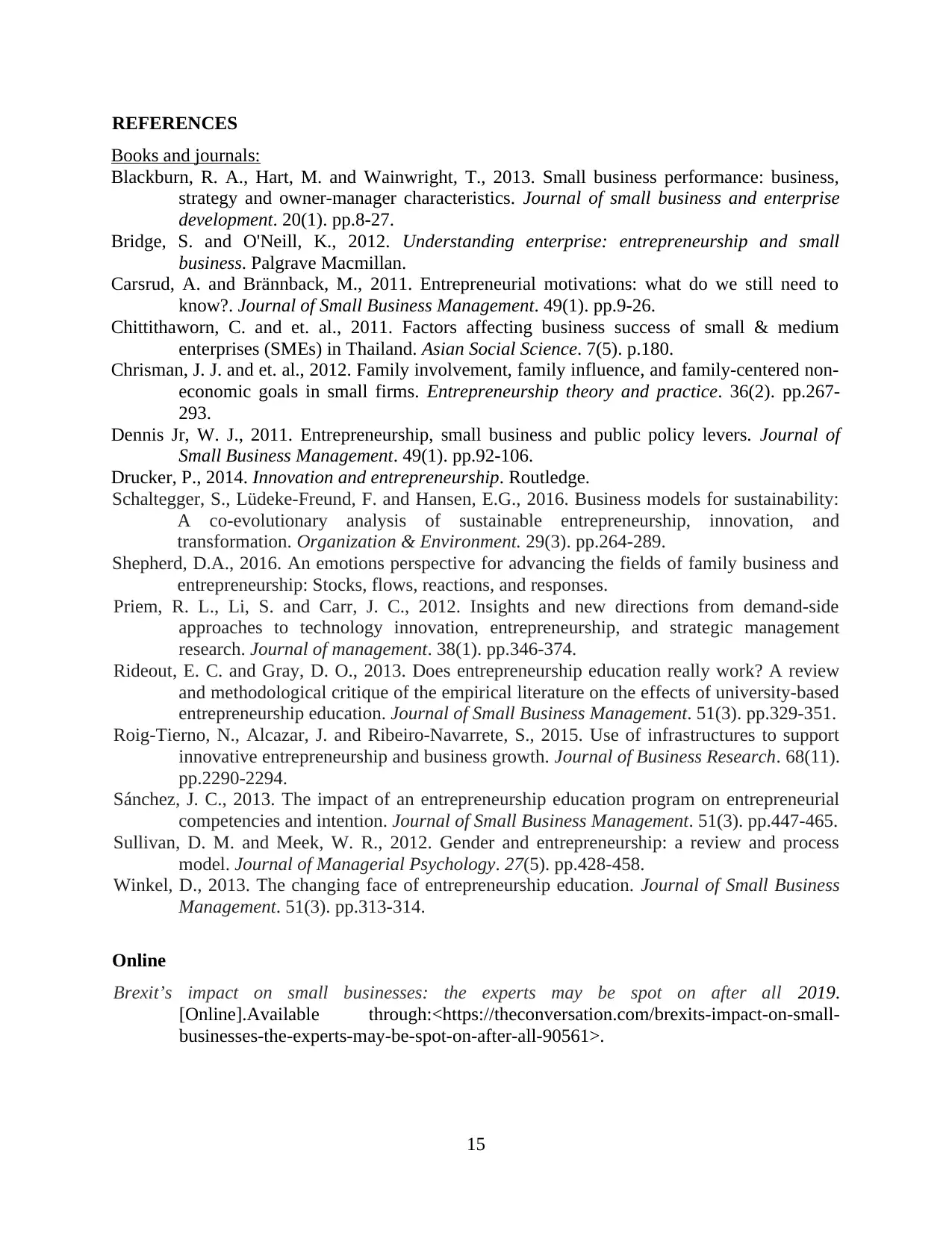
REFERENCES
Books and journals:
Blackburn, R. A., Hart, M. and Wainwright, T., 2013. Small business performance: business,
strategy and owner-manager characteristics. Journal of small business and enterprise
development. 20(1). pp.8-27.
Bridge, S. and O'Neill, K., 2012. Understanding enterprise: entrepreneurship and small
business. Palgrave Macmillan.
Carsrud, A. and Brännback, M., 2011. Entrepreneurial motivations: what do we still need to
know?. Journal of Small Business Management. 49(1). pp.9-26.
Chittithaworn, C. and et. al., 2011. Factors affecting business success of small & medium
enterprises (SMEs) in Thailand. Asian Social Science. 7(5). p.180.
Chrisman, J. J. and et. al., 2012. Family involvement, family influence, and family‐centered non‐
economic goals in small firms. Entrepreneurship theory and practice. 36(2). pp.267-
293.
Dennis Jr, W. J., 2011. Entrepreneurship, small business and public policy levers. Journal of
Small Business Management. 49(1). pp.92-106.
Drucker, P., 2014. Innovation and entrepreneurship. Routledge.
Schaltegger, S., Lüdeke-Freund, F. and Hansen, E.G., 2016. Business models for sustainability:
A co-evolutionary analysis of sustainable entrepreneurship, innovation, and
transformation. Organization & Environment. 29(3). pp.264-289.
Shepherd, D.A., 2016. An emotions perspective for advancing the fields of family business and
entrepreneurship: Stocks, flows, reactions, and responses.
Priem, R. L., Li, S. and Carr, J. C., 2012. Insights and new directions from demand-side
approaches to technology innovation, entrepreneurship, and strategic management
research. Journal of management. 38(1). pp.346-374.
Rideout, E. C. and Gray, D. O., 2013. Does entrepreneurship education really work? A review
and methodological critique of the empirical literature on the effects of university‐based
entrepreneurship education. Journal of Small Business Management. 51(3). pp.329-351.
Roig-Tierno, N., Alcazar, J. and Ribeiro-Navarrete, S., 2015. Use of infrastructures to support
innovative entrepreneurship and business growth. Journal of Business Research. 68(11).
pp.2290-2294.
Sánchez, J. C., 2013. The impact of an entrepreneurship education program on entrepreneurial
competencies and intention. Journal of Small Business Management. 51(3). pp.447-465.
Sullivan, D. M. and Meek, W. R., 2012. Gender and entrepreneurship: a review and process
model. Journal of Managerial Psychology. 27(5). pp.428-458.
Winkel, D., 2013. The changing face of entrepreneurship education. Journal of Small Business
Management. 51(3). pp.313-314.
Online
Brexit’s impact on small businesses: the experts may be spot on after all 2019.
[Online].Available through:<https://theconversation.com/brexits-impact-on-small-
businesses-the-experts-may-be-spot-on-after-all-90561>.
15
Books and journals:
Blackburn, R. A., Hart, M. and Wainwright, T., 2013. Small business performance: business,
strategy and owner-manager characteristics. Journal of small business and enterprise
development. 20(1). pp.8-27.
Bridge, S. and O'Neill, K., 2012. Understanding enterprise: entrepreneurship and small
business. Palgrave Macmillan.
Carsrud, A. and Brännback, M., 2011. Entrepreneurial motivations: what do we still need to
know?. Journal of Small Business Management. 49(1). pp.9-26.
Chittithaworn, C. and et. al., 2011. Factors affecting business success of small & medium
enterprises (SMEs) in Thailand. Asian Social Science. 7(5). p.180.
Chrisman, J. J. and et. al., 2012. Family involvement, family influence, and family‐centered non‐
economic goals in small firms. Entrepreneurship theory and practice. 36(2). pp.267-
293.
Dennis Jr, W. J., 2011. Entrepreneurship, small business and public policy levers. Journal of
Small Business Management. 49(1). pp.92-106.
Drucker, P., 2014. Innovation and entrepreneurship. Routledge.
Schaltegger, S., Lüdeke-Freund, F. and Hansen, E.G., 2016. Business models for sustainability:
A co-evolutionary analysis of sustainable entrepreneurship, innovation, and
transformation. Organization & Environment. 29(3). pp.264-289.
Shepherd, D.A., 2016. An emotions perspective for advancing the fields of family business and
entrepreneurship: Stocks, flows, reactions, and responses.
Priem, R. L., Li, S. and Carr, J. C., 2012. Insights and new directions from demand-side
approaches to technology innovation, entrepreneurship, and strategic management
research. Journal of management. 38(1). pp.346-374.
Rideout, E. C. and Gray, D. O., 2013. Does entrepreneurship education really work? A review
and methodological critique of the empirical literature on the effects of university‐based
entrepreneurship education. Journal of Small Business Management. 51(3). pp.329-351.
Roig-Tierno, N., Alcazar, J. and Ribeiro-Navarrete, S., 2015. Use of infrastructures to support
innovative entrepreneurship and business growth. Journal of Business Research. 68(11).
pp.2290-2294.
Sánchez, J. C., 2013. The impact of an entrepreneurship education program on entrepreneurial
competencies and intention. Journal of Small Business Management. 51(3). pp.447-465.
Sullivan, D. M. and Meek, W. R., 2012. Gender and entrepreneurship: a review and process
model. Journal of Managerial Psychology. 27(5). pp.428-458.
Winkel, D., 2013. The changing face of entrepreneurship education. Journal of Small Business
Management. 51(3). pp.313-314.
Online
Brexit’s impact on small businesses: the experts may be spot on after all 2019.
[Online].Available through:<https://theconversation.com/brexits-impact-on-small-
businesses-the-experts-may-be-spot-on-after-all-90561>.
15
1 out of 17
Related Documents
Your All-in-One AI-Powered Toolkit for Academic Success.
+13062052269
info@desklib.com
Available 24*7 on WhatsApp / Email
![[object Object]](/_next/static/media/star-bottom.7253800d.svg)
Unlock your academic potential
© 2024 | Zucol Services PVT LTD | All rights reserved.





